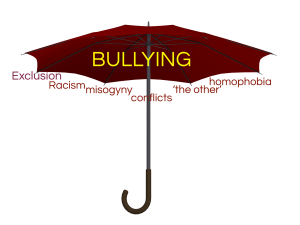Bullying in the workplace can take many forms, including verbal abuse, social exclusion, and physical intimidation.
Speaking from 20 years of experience dealing with workplace bullying as a female RCMP officer, it takes a heavy toll. It can cause significant emotional distress, as well as negatively impact job performance and overall well-being. Victims focus on staying alive and safe and this affects their work performance and all relationships. If you are experiencing bullying in the workplace, it is important to take steps to address the situation. Some tips can help you navigate through it.
- Document, document and document the bullying. Keep a record of the incidents, including the date, time, and what was said or done. Any witnesses? This documentation can be used to support your case if you choose to report the bullying to your employer or to legal authorities.
- Speak up. Remember your voice counts. It can be difficult to speak out against a bully,(especially if there is a power imbalance) but it is important to let them know that their behavior is not acceptable. It is best to address the bully directly and assertively but in a calm and professional manner. Learn to set boundaries.
- Find support. Seek out positive support. Reach out to a trusted colleague, friend, or family member for support. It can also be helpful to seek counseling or therapy to help you cope with the emotional effects of bullying. Therapy certainly saved me on the journey from despair to empowerment. Create positive self-care tools.
- Report the bullying to your employer. Your employer has a legal responsibility to provide a safe working environment and should be made aware of any bullying taking place within the workplace.
- Know your rights. To bully is illegal under some laws, and many employers have policies and procedures in place to deal with bullying. Familiarize yourself with these policies and understand your rights as an employee. Policies are only as effective as those willing to enforce them.
It’s important to remember that Bullying is not just about physical harm, but also about psychological harm. The long-term impact of it can be life-altering. That’s why it’s important to take immediate action and not let it continue.

What about the impact of bullying?
- Emotional distress: Victims often experience a range of negative emotions, such as anxiety, depression, and fear. They may also experience feelings of shame, guilt, and low self-esteem.
- Difficulty in concentration and sleep: Bullying can cause victims to have difficulty concentrating on their work and can lead to insomnia and other sleep disorders.
- Physical health problems: The stress and anxiety caused by it can lead to physical health problems such as headaches, stomach aches, and fatigue.
- Reduced job performance: Bullying can negatively impact an individual’s job performance, leading to decreased productivity and, also, poor work quality.
- Impact on mental health: Bullying can lead to long-term mental health issues such as PTSD, which can affect an individual’s ability to function in daily life and lead to a loss of self-esteem.
- Social isolation: Bullying can lead to social isolation and exclusion from social groups, which can further exacerbate feelings of distress and loneliness.
- Long-term negative impact on career: A victim may experience difficulty in finding new employment, and could experience a negative impact on their professional career. Making poor career decisions, and poor relationship choices too.
- In extreme cases, suicide: Bullying can be so severe that it can lead to suicide or suicidal thoughts. In some cases, a victim can never fully recover only to take their life years later.
It is important to note that the impact of bullying can be different for each individual, as it can be influenced by factors such as the severity of the it, the duration, and the support the victim receives. It’s crucial to take immediate action and get the necessary support, to prevent the impact from becoming severe. Sadly, often bullying can become normalized as an everyday occurrence, a slow escalation in violence. But, yes, there are serious consequences. Actions and words can destroy people.

(exclusion, racism, misogyny, conflicts, homophobia, ‘the other’).
In conclusion, bullying in the workplace can be a difficult and distressing experience. I continue to struggle on a daily basis with workplace bullying. It is important to take action to address the situation and to seek support from colleagues, friends, and professionals. So remember that you have rights and that your employer has a legal responsibility to provide a safe working environment. With the right steps, tools and strategies for self-care, and positive supports you can take control of the situation and work towards a resolution.
